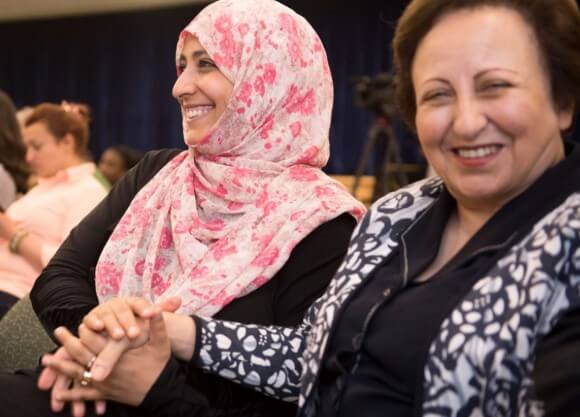
Nobel laureates inspire peace
October 20, 2016

October 20, 2016

Tawakkol Karman was a journalist and became a leader in Yemen's democracy movement.
“We convinced people to come to the streets to force our dictator to step down,” said Karman, who is considered “mother of revolution” in Yemen. “We carried flowers and our dreams for a good life…and in our peaceful way, we forced [president Ali Abdullah Saleh] to resign in November 2011.”
The standing-room-only audience in Burt Kahn Court broke into applause for Karmen.
In 2011, she shared the Nobel Peace Prize with Leymah Gbowee, a leader in Liberia's movement toward democracy and interfaith understanding. At Quinnipiac, the two women shared the stage with Shirin Ebadi, the first female judge in Iran and 2003 Nobel Peace Prize winner.
Three laureates discussed peace, gender issues and human rights in a fall panel discussion sponsored by the Albert Schweitzer Institute at Quinnipiac.
Karman said their success was the result of believing they could achieve their dream without violence. Peace lasted for only two years, during which time a constitution was drafted that guaranteed equality and freedom, she noted.
“Unfortunately and suddenly, a coup happened. The ousted president used the militia to collapse everything,” she told the audience. “Ten thousand people went to prison, newspapers were closed, and radio and TV were censored. But did it collapse our dream or will to continue? Of course not. Every great revolution is followed by a counterrevolution. At the end, the people win. We continue our struggle, and we will not give up. It’s our destiny and our future.”
Karman was awarded the Nobel Peace Prize in recognition of her work in nonviolent struggle for the safety of women and for women's rights to fully participate in peacebuilding in Yemen. Karman became the first Yemeni, the first Arab woman, the second Muslim woman to win a Nobel Peace Prize, and at age 32, she also became the youngest Nobel Peace Laureate to date. She is a mother of three as well as a human rights activist, journalist, politician, and senior member of the Al-Islah political party.
Gbowee, founder and president of the Gbowee Peace Foundation, is a Liberian peace activist, social worker and women's rights advocate who was awarded the Nobel Prize in 2011. She is best known for leading a nonviolent movement that brought together Christian and Muslim women to play a pivotal role in ending Liberia's 14-year civil war. This historic achievement paved the way for the election of Africa's first female head of state, Liberian President Ellen Johnson Sirleaf. It also marked the vanguard of a new wave of women emerging worldwide as essential and uniquely effective participants in brokering lasting peace and security.
Ebadi is an Iranian lawyer, a former judge and human rights activist and founder of the Defenders of Human Rights Center in Iran. In 2003, Ebadi was awarded the Nobel Peace Prize for her significant and pioneering efforts for democracy and human rights, especially women's, children's and refugee rights. She was the first ever Iranian to receive the prize.
"Ten thousand people went to prison, newspapers were closed, and radio and TV were censored. But did it collapse our dream or will to continue? Of course not. Every great revolution is followed by a counterrevolution. At the end, the people win. We continue our struggle, and we will not give up. It’s our destiny and our future.” said Tawakkol Karman, a leader in Yemen's democracy movement and 2011 Nobel Peace Prize laureate.
Quinnipiac Today is your source for what's happening throughout #BobcatNation. Sign up for our weekly email newsletter to be among the first to know about news, events and members of our Bobcat family who are making a positive difference in our world.
Sign Up Now